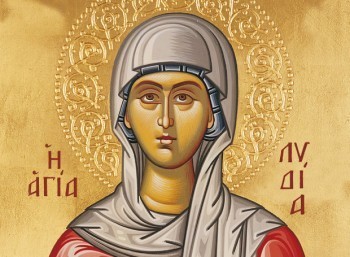
Lydia, a figure prominently featured in the New Testament, was a seller of purple cloth in Philippi, an ancient Greek city. Her life, though scant in detail, provides a significant example of early Christian conversion and the role of women in the nascent church. Lydia’s story is mainly recounted in the Acts of the Apostles (Acts 16:14-15), marking her as a pivotal early Christian believer. The exact dates of her birth and death remain unspecified in historical records. As a saint in Christian tradition, Saint Lydia’s conversion and subsequent actions play a vital role in understanding the spread of Christianity in the Roman world.
Lydia’s Background and Profession
Lydia originated from Thyatira, a city known for its dyeing industry, and later settled in Philippi. Her profession as a seller of purple cloth, a luxury item in the Roman Empire, indicates she was a woman of considerable means and social standing. Purple dye, extracted from the murex snail, was expensive and sought after, especially among Roman nobility. Lydia’s success in this trade underscores her business acumen and independence in a male-dominated society.
Conversion and Role in the Early Church
Lydia’s conversion to Christianity is a pivotal moment in the Acts of the Apostles. She was converted by Paul the Apostle during his second missionary journey. Lydia’s conversion is significant as it marks the start of the Christian church in Philippi, which later became a major center of early Christianity. Her open acceptance of Paul’s teachings and baptism demonstrates her spiritual openness and leadership. Following her baptism, Lydia extended hospitality to Paul and his companions, indicating her commitment and support to the Christian community.
Lydia’s Legacy and Influence
Saint Lydia’s legacy in Christian tradition extends beyond her conversion. She is often regarded as a symbol of Christian piety and hospitality. Her house in Philippi possibly served as a gathering place for early Christians, making it one of the first domestic churches. Lydia’s story has inspired numerous Christian women throughout history, highlighting the essential role of women in the early church and their contributions to its growth and establishment.
Lydia’s story, while brief in the Biblical narrative, provides profound insights into the early Christian church’s development. Her conversion, business acumen, and support for Paul’s mission encapsulate the dynamic role of women in the early Christian community. As a saint, her legacy continues to inspire and inform contemporary understanding of early Christian history.
Feast Day: May 20
References
- Conzelmann, Hans. “Acts of the Apostles.” Fortress Press, 1987.
- Fitzmyer, Joseph A. “The Acts of the Apostles: A New Translation with Introduction and Commentary.” Yale University Press, 1998.
- Levine, Amy-Jill, and Brettler, Marc Z. “The Jewish Annotated New Testament.” Oxford University Press, 2011.
- Murphy-O’Connor, Jerome. “Paul: A Critical Life.” Oxford University Press, 1996.
- Winter, Bruce W. “Philippi: How Christianity Began in Europe.” Eerdmans Publishing, 2013.
